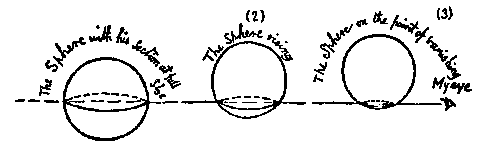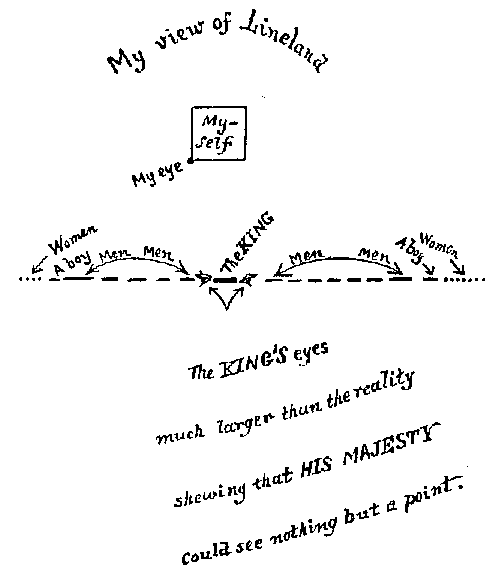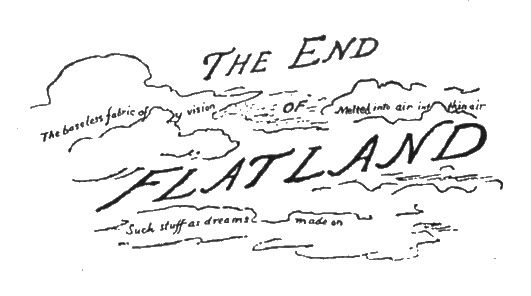If I have seen further,
it is by standing on ye shoulders of Giants.
– Sir Isaac Newton
I remember when I was in junior high school, we had to read a book called Flatland. It wasn’t a very long book – more like a novella, really – certainly not a weighty tome like The Iliad, or a classic work of literature like Great Expectations, both of which we also read. It was a small book, paperback, not much bigger than The Elements of Style, a book you could read in one sitting easily, if you stayed focused. I took two or three sittings, as I recall.
As I say, Flatland was no Iliad. But while Edwin A. Abbott’s opus didn’t carry the physical or cultural heft of Homer or Dickens, I remember to this day its lesson, a lesson about perspective, ignorance and arrogance.
Which brings me, unavoidably, to the Democratic Party.
hekebolos, in his diary today, relates his unique, well-founded “insider” perspective on the reality-defying beliefs of much of the power structure of the California Democratic Party. He cites this priceless quote from one of Sacramento’s Very Serious Democratic Power Brokers, who was pooh-poohing an effort to censure Sen. Dianne Feinstein for her votes on Michael Mukasey, FISA, and Leslie Southwick:
Bob Mulholland, a veteran party strategist in Sacramento[, said,] “Sometimes people can’t anticipate or can’t understand the big picture.”
Ya don’t say – Bob.
Flatland is the story of its narrator, a Square who resides in a two-dimensional world of geometric shapes, all of whom are confined to an infinite plane its inhabitants call Flatland. Confined as they are to two dimensions, Flatlanders have no concept of depth. Their experience of each other is limited to encounters along the same plane; the existence of angles to define the various Triangles, Squares, Pentagons, and so forth that populate Flatland is only vaguely guessed, since, from the Flatlanders’ perspective, angles do not exist – only lines of varying lightness and darkness (as they “angle” away from the viewer’s point of view).
The narrator’s world is shaken to its foundation when he encounters, in a rare millennial occurrence (interestingly, the book, written in 1884, is set on New Year’s Eve, 1999), a Sphere from Spaceland, the world of three dimensions (in other words, the world that we humans know). The Sphere, unable to convince the Square with logic and words about the existence of other dimensions, is left with no choice but to force the Square to join him, literally, outside the box.
“Back! back! [” exclaimed the Sphere. “] Away from me, or you must go with me – whither you know not – into the Land of Three Dimensions!”“Fool! Madman! Irregular!” I exclaimed; “never will I release thee; thou shalt pay the penalty of thine impostures.”
“Ha! Is it come to this?” thundered the Stranger: “then meet your fate: out of your Plane you go. Once, twice, thrice! ‘Tis done!”
What the Square sees and experiences as the Sphere – a sort of geometric equivalent to Marley’s ghost – takes him on a tour of Flatland, Lineland (the one-dimensional world) and Pointland (a world consisting of only a single Point), all from the perspective of three dimensions – beggars the narrator’s powers of verbal description.
It is enough for the Square to be lifted just ever so slightly above the plane of Flatland – the only plane of existence he had ever previously known – to be able to see things he never could have seen otherwise, to see (as best he could describe it) “into” things that otherwise had remained closed.
Once more I felt myself rising through space. It was even as the Sphere had said. The further we receded from the object we beheld, the larger became the field of vision. My native city, with the interior of every house and every creature therein, lay open to my view in miniature. We mounted higher, and lo, the secrets of the earth, the depths of the mines and inmost caverns of the hills, were bared before me.

We really shouldn’t be surprised by the condescending, breathtakingly arrogant attitude demonstrated in Bob Mulholland’s remark. After all, he is simply saying in words what so much of the “mainstream” Democratic establishment in the U.S. Congress has been telling us with its actions over the past 10 months; that is to say, we know better than the people who put us here.
And, you know what? Who can blame them, really? I mean, they’ve lived, most of them, their entire adult life in the second dimension, lacking perspective, making judgments based on what they can see from their vantage point within the Inner Circles of the Democratic Party: wandering around the Flatland of party politics, always seeing the same people, always bumping into the same ideas, always fighting the same wars.
Democratic Party insiders, when they hear the voices of Real People coming from outside their Inner Circles, fume and sputter that somehow we are the ones who have gotten it wrong, that we are the ones who do not understand The Way Things Are:
“I am the Monarch of the world. But thou, whence intrudest thou into my realm of Lineland?” Receiving this abrupt reply, I begged pardon if I had in any way startled or molested his Royal Highness; and describing myself as a stranger I besought the King to give me some account of his dominions. But I had the greatest possible difficulty in obtaining any information on points that really interested me; for the Monarch could not refrain from constantly assuming that whatever was familiar to him must also be known to me and that I was simulating ignorance in jest. However, by preserving questions I elicited the following facts:

It seemed that this poor ignorant Monarch – as he called himself – was persuaded that the Straight Line which he called his Kingdom, and in which he passed his existence, constituted the whole of the world, and indeed the whole of Space. Not being able either to move or to see, save in his Straight Line, he had no conception of anything out of it. Though he had heard my voice when I first addressed him, the sounds had come to him in a manner so contrary to his experience that he had made no answer, “seeing no man,” as he expressed it, “and hearing a voice as it were from my own intestines.” Until the moment when I placed my mouth in his World, he had neither seen me, nor heard anything except confused sounds beating against, what I called his side, but what he called his inside or stomach; nor had he even now the least conception of the region from which I had come. Outside his World, or Line, all was a blank to him; nay, not even a blank, for a blank implies Space; say, rather, all was non-existent.
Alternatively, they dismiss those voices as mere imaginings:
“Look yonder,” said my Guide, “in Flatland thou hast lived; of Lineland thou hast received a vision; thou hast soared with me to the heights of Spaceland; now, in order to complete the range of thy experience, I conduct thee downward to the lowest depth of existence, even to the realm of Pointland, the Abyss of No dimensions.“Behold yon miserable creature. That Point is a Being like ourselves, but confined to the non-dimensional Gulf. He is himself his own World, his own Universe; of any other than himself he can form no conception; he knows not Length, nor Breadth, nor Height, for he has had no experience of them; he has no cognizance even of the number Two; nor has he a thought of Plurality; for he is himself his One and All, being really Nothing. Yet mark his perfect self-contentment, and hence learn his lesson, that to be self-contented is to be vile and ignorant, and that to aspire is better than to be blindly and impotently happy. Now listen.”
He ceased; and there arose from the little buzzing creature a tiny, low, monotonous, but distinct tinkling, as from one of your Spaceland phonographs, from which I caught these words, “Infinite beatitude of existence! It is; and there is nothing else beside It.”
“What,” said I, “does the puny creature mean by ‘it’?” “He means himself,” said the Sphere: “have you not noticed before now, that babies and babyish people who cannot distinguish themselves from the world, speak of themselves in the Third Person? But hush!”
“It fills all Space,” continued the little soliloquizing Creature, “and what It fills, It is. What It thinks, that It utters; and what It utters, that It hears; and It itself is Thinker, Utterer, Hearer, Thought, Word, Audition; it is the One, and yet the All in All. Ah, the happiness, ah, the happiness of Being!”
“Can you not startle the little thing out of its complacency?” said I. “Tell it what it really is, as you told me; reveal to it the narrow limitations of Pointland, and lead it up to something higher.” “That is no easy task,” said my Master; “try you.”
Hereon, raising by voice to the uttermost, I addressed the Point as follows:
“Silence, silence, contemptible Creature. You call yourself the All in All, but you are the Nothing: your so-called Universe is a mere speck in a Line, and a Line is a mere shadow as compared with -” “Hush, hush, you have said enough,” interrupted the Sphere, “now listen, and mark the effect of your harangue on the King of Pointland.”
The lustre of the Monarch, who beamed more brightly than ever upon hearing my words, shewed clearly that he retained his complacency; and I had hardly ceased when he took up his strain again. “Ah, the joy, ah, the joy of Thought! What can It not achieve by thinking! Its own Thought coming to Itself, suggestive of its disparagement, thereby to enhance Its happiness! Sweet rebellion stirred up to result in triumph! Ah, the divine creative power of the All in One! Ah, the joy, the joy of Being!”
“You see,” said my Teacher, “how little your words have done. So far as the Monarch understand them at all, he accepts them as his own – for he cannot conceive of any other except himself – and plumes himself upon the variety of ‘Its Thought’ as an instance of creative Power. Let us leave this God of Pointland to the ignorant fruition of his omnipresence and omniscience: nothing that you or I can do can rescue him from his self-satisfaction.”
Ever since the elections a year ago that gave control of Congress to Democrats, the single overarching source of disagreement between Establishment Democrats and those who put them into power has been the matter of putting a halt to executive abuses of power, whether in the area of waging an illegal war, defying congressional oversight, violating duly enacted law, committing treasonous acts, abridging the civil rights of Americans, or engaging in war crimes.
Those who have loudly and repeatedly expressed dissatisfaction with the self-evident unwillingness of many congressional Democrats – including those in leadership positions, and especially including those who, like Feinstein, are in absolutely no danger of losing to a Republic challenger in the next election – to stand up and Do The Right Thing by the Constitution, are constantly being told by those self-same Democrats that It’s Too Politically Risky, that We Know Better Than You About These Things, that standing for the integrity of the Constitution is only worth it if you can succeed.
Such is the view of the Flatlander Democrats in charge of the party. Party before all, they believe:
State Democratic Party Chairman Art Torres did not return messages seeking comment. But his spokesman Roger Salazar told the Sacramento Bee, “this party supports our Democratic senator and will continue to do so . . . Period.”
That was a Democrat speaking – an establishment Democrat, aide to a very powerful Democrat in the California party.
Party before constituents.
Party before Constitution.
We get it.
Say no more.
You’re limited by your perspective, down on The Flats.
We understand.
It doesn’t take much of an elevation, a terribly heightened perspective, for one to rise above the Flatland of party politics. And once one has attained that elevation it is easy for one to see inside all of the petty, cautious, fearful, ambitious, venal, small-minded machinations and reveal them for what they are.
An elevated perspective also gives the viewer an ability not only to see more of what is going on, it also allows him to put what is going on into context, to see how what is going on fits into, relates to, affects everything else that is going on. It allows the viewer to act more effectively, with greater knowledge of – guess what, Bob – The Really Big Picture.
The framers of our Constitution had a perspective that allowed them to create a framework that has withstood – so far – the test of time. They were literally children of the Enlightenment, imbued and conversant with the ideas not only of Hobbes, but also of Locke and Rousseau. Their life experience and worldview made it possible for them to pen words like, “We hold these truths to be self-evident, that all men are created equal, that they are endowed by their Creator with certain unalienable rights, that among these are Life, Liberty, and the pursuit of Happiness,” without sounding ridiculous. Can you imagine more than a small handful of today’s political figures being able to write such words, such powerful words, words that would not only stand the test of time, but would speak truth about the human condition, truth that would transcend age, income, race, creed, or any other demographic cubbyhole?
It’s not that those “Democratic insiders” who reside in Flatland cannot perceive the vantage point of the framers of the Constitution; it is just that, to those whose entire political existence has been taken up with party politics, the higher perspective and context provided by the Constitution is merely a dot in the firmament, something abstract and out of reach, a bright, twinkling light painted on the dome of the sky that, at most, revolves around the party-centric world of the political insider, and not the other way around. Democratic Flatlanders believe – and demonstrate it every week in Congress by the choices they make – that the very document that forms the framework within which their entire two-dimensional political universe exists is much less important than the political folderol that that document has made it possible for them to waste their time pursuing.
If I have seen further,
it is by standing on ye shoulders of Giants.
– Sir Isaac Newton
Do we have any such Giants among us?
And the truth is, we’re not even asking for Giants. We’re just asking for elected officials who will elevate themselves just enough to rise above the level of party politics, who will move just slightly toward that firmament of Constitutional thought, to gain just enough perspective to see all of the petty machinations down in political Flatland for what they are: two-dimensional twaddle told by idiots, full of sound and fury, signifying nothing.
We demand that our elected officials join us in the rich, challenging, meaningful, messy third dimension of politics: that whose baseline is the Constitution, and in which exists the only possibility for the continued success of this experiment called the United States of America.

Also available in Orange

5 comments
Skip to comment form
Author
We as a nation can rise above the sad fate of the Square, who was thrown in prison for the heresy of speaking of a third dimension:
Rise up!
Thank you for this. Extremely well done! And very a propos.
I was always curious about Flatland, as profs in statistics courses often referred to it–without political connotations. Thanks for the quotes that give me a much better feeling for the book.
What a wonderful essay, Occam!
It is enough for the Square to be lifted just ever so slightly above the plane of Flatland – the only plane of existence [s]he had ever previously known – to be able to see things he never could have seen otherwise… to scare the hell out of her and make her run back to the familiar.
“You mean… you mean… I could actually save my party, my seat, and my power? If I only wasn’t so afraid to leave my one dimensional world that I could lift my head and see that it’s the two dimensional beings that can make me… or break me??”